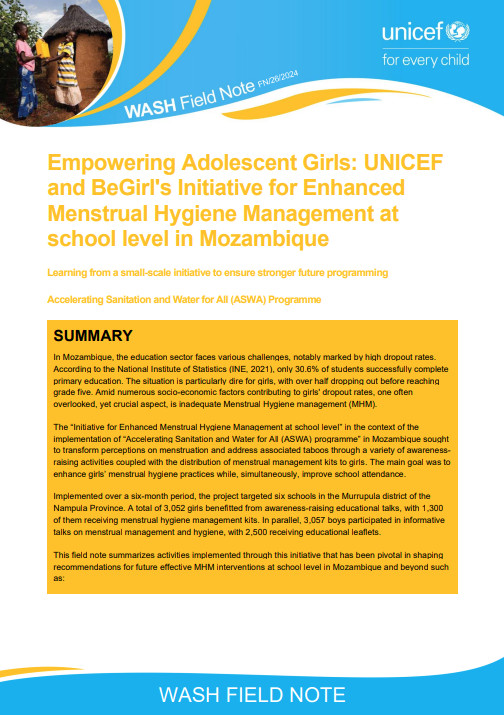Lessons from Mozambique on UNICEF and BeGirl's Initiative for Enhanced Menstrual Hygiene Management
 |
Field Note
récit d'expérience Jun 2024 ; 15 pages
Ed. UNICEF - New York UNICEF - Maputo
Téléchargeable sous format: PdF
Téléchargeable chez l'éditeur
Abstract:
UNICEF and BeGirl collaborated on a project to improve menstrual hygiene management (MHM) for girls in Mozambique, aiming to reduce school dropout rates by addressing MHM challenges and taboos. Over 3,000 girls received educational talks and 1,300 received MHM kits, resulting in increased school attendance and comfort during menstruation. Boys also received education on MHM, promoting inclusivity. The document outlines key recommendations for future MHM programs, including partnerships with expert organizations, integrated education and product distribution, eco-friendly solutions, and community-led social enterprises. Emphasizing the importance of environmental sustainability, the project introduced reusable menstrual products and advocated for their adoption through local production and distribution, aligning with UNICEF’s climate approach.
Mots clefs: |
accès à l'assainissement (CI) (DT) (OP) (ope) , accès à l'eau (CI) (DT) (OP) (ope) , école (CI) (DT) (OP) (ope) , hygiène menstruelle (CI) (DT) (OP) (ope) |
Pays concerné: |
Editeurs/Diffuseurs: |
|
UNICEF - New York - Etats Unis |
UNICEF - Maputo - Mozambique |
En cas de lien brisé, nous le mentionner à communication@pseau.org